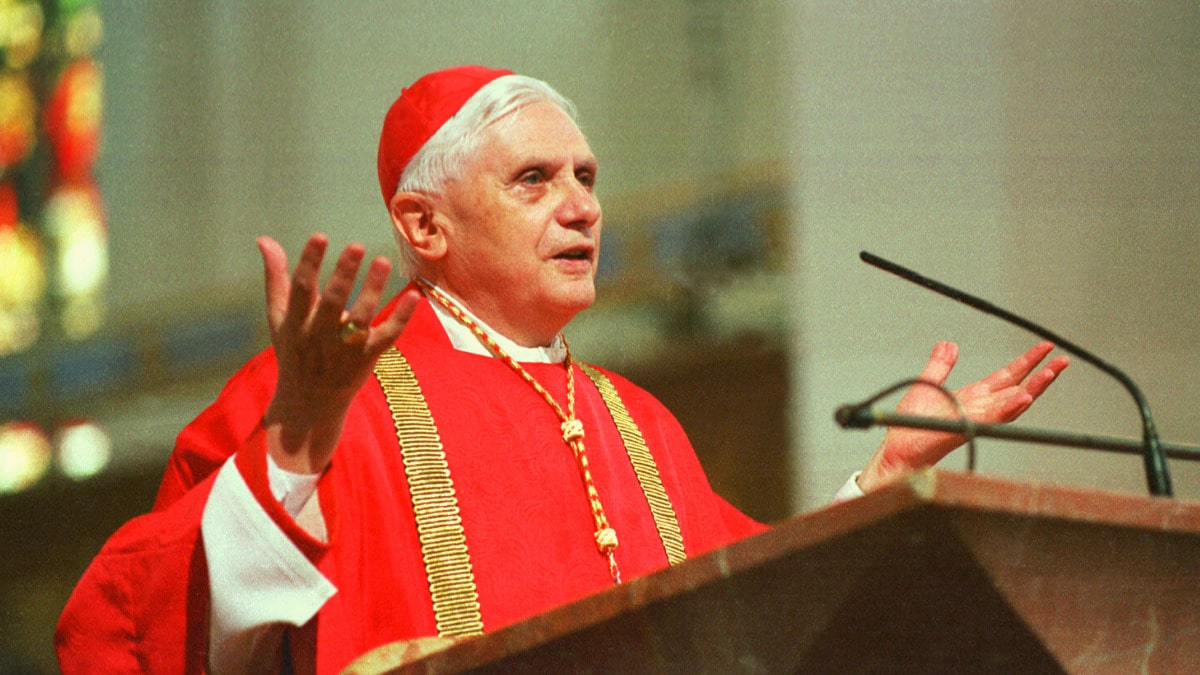
7. Optavi et datus est mihi sensus
In these pages we have dealt primarily with Americanism in a fourth of its meanings mentioned at the beginning. However, elements related to the second meaning have appeared on some occasions. This is the one to which we will devote some final reflections, looking at it, in any case, from the political point of view, since a crystal-clear axis connects the theological premises and the political consequences.
If eminently theological issues such as activism are at the heart of the papal condemnation mentioned above, other more political issues (though no less theological in substance) are not without relevance, such as the separation of Church and State, as seen in the experience of the United States of America.
Indeed, one of the central theses of Americanism is to elevate this situation to an ideal (19). Often characterized as laicism as opposed to laicité, and even described as inclusive or positive laicité, a brief problematic examination of both aspects is necessary. First of all, laicism and laicité (20). Two related terms. With intertwined meanings. The first is denoted by the suffix “ism”, associated with an ideology. An ideology, the liberal one, based on the marginalization of the Church from human and social realities. In fact, the rationalistic naturalism put into practice in the liberal revolution and condemned by the Magisterium of the Church received, among others, the name of laicism, generally translated into English as secularism. The second was initially related to a situation created by this ideology in France in the last third of the nineteenth century. Thus, laicism and laicité are terms that express the same concept.
Today, on the other hand, it seems that there are sectors interested in opposing them. First of all, “clericalism” (taking the term in the sense given to it by Augusto del Noce (21), that is, the subordination of Catholic political and intellectual discourse to the dominant one at any given time) and Christian Democracy. Aggressive laicism would thus be distinguished from respectful laicité, and the pair “laicism and laicité” would be interpreted disjunctively as “laicism or laicité”. But is such an opposition justified, or is it rather a simple nuance between two versions of the same ideology? One indication, among many and of singular relevance, leads us to this second possibility: the protest of the followers of laicité to respect the “separation” between Church and State, with the consequent rejection of the thesis of the Catholic State. However, the Church cannot (without betraying her mission) fail to affirm that there is a natural moral law which she defends and to which the public authorities must submit (22). This is the core of the “Catholic State” (which is not the modern State but the classical political community), of what is called, with a terminology of Protestant origin, “the confessionality of the State” and, with a traditional denomination that presupposes a sociological majority, “Catholic unity” (23).
When it is affirmed that “no (religious) confession will have a state character” – as is done, for example, in article 16 of the Spanish Constitution – one could think that one has not left the scope of this traditional thesis, since the Catholic State, far from nationalizing religion, submits to the moral invariant of the political order (24). In practice, however, what is being postulated is a political agnosticism that cannot but end up demanding the submission of the Church (forgetting its mission as guarantor of this public orthodoxy) to the State: the “laicity of the State” always ends up in the “laicity of the Church” (25), that is, in the demand that the latter renounce its mission and limit itself to offering its “product” (pure choice) while respecting the rules of the “market”. This has always been the logic of laicism, but now – after the heyday of “civil religions” – it is clearly evident. For the same reason, in the face of the false opposition between laicism and laicité, it must be proclaimed that there is “neither laicism nor laicité“.
Finally, inclusive laicité as opposed to exclusionary laicité. A reflection, according to many, of the previous distinction between laicité and laicism. Our dear colleague Professor Danilo Castellano has addressed this argument with great depth and precision (26). Let me summarize it here.
First of all, the problem is presented – in effect – in new terms. Inclusive laicité considers and includes the religious phenomenon, but as a right to the exercise of negative freedom, in such a way that it is not nature (of man, of things) that gives rise to juridical institutions and rights, but – on the contrary – the juridical order becomes a condition of law. That is to say, properly speaking, juridical nihilism based on freedom of conscience, the latter understood as a vital principle.
We then find two paths, the French and the American. Although both refer to the present experience, the former corresponds to the old model of secularism (laicism), whose anti-religious militancy has been amputated, and inevitably suffers from the attraction of the latter, to which it inclines without being aware of it. In fact, the “French way” privileges the rights of collective identity, which is why it suffers tensions within itself when it proclaims, not without emphasis, freedom of conscience: the individual is free in the freedom of the State and within the State. But the State, to be truly secular, should be indifferent to every option and every project… The “American way” was introduced: it is the individual and not the State that would have the right to exercise negative freedom; the latter would be the institution at the service of the projects of civil society and even (in a radical version) of the individual. But the neutrality of the juridical order is impossible, so that even this path is not without limits and contradictions. Secularism thus ends up in a dead end. On the one hand, not only does it not solve any political or social problem, but it actually exacerbates them. On the other hand, inclusive laicité ends up being more absurd than excluding laicité, because it does not even seek an ideological pseudo-solution that still preserved some positive aspects, but enters directly into the realms of nihilism.
(19) Here again, Cardinal Ratzinger has expressed himself in very questionable terms. In statements to Vatican Radio on the subject of comparing the European and American approaches to different religions, he affirmed: “I think that from many points of view the American model is better, while Europe remains based on Caesaropapism. People who did not want to belong to a state church went to America and deliberately created a state that does not impose a church and is not seen as religiously neutral, but as a space in which religions can move and enjoy organizational liberty without simply being relegated to the private sphere […]. In this sense, we can certainly learn from the United States and the process by which the State gives space to religion, which is not imposed, but thanks to which it lives, exists and has a public creative force, which is certainly a positive path” (Joseph RATZINGER, “Il laicismo europeo tende ad un dogmatismo che minaccia la libertà religiosa”, Agence Zenit, November 22, 2004). This, of course, is pure Americanism.
(20) Here I reprint the conclusions of my book La constitución cristiana de los Estados, Barcelona, Scire, 2008, pp. 117 ff. “Laicism” would be equivalent to “secularism,” while “laicité” is sometimes used as a synonym for the former, and at other times it is used as “secularity,” giving it a positive meaning.
(21) Augusto DEL NOCE, “Giacomo Noventa: dagli errori della cultura alle difficoltà in política”, L’Europa (Rome), núm. 4 (1970).
(22) Pius XI, “Ubi arcano Dei” (1922), n. 18.
(23) In one of the last acts of his pontificate, on February 11, 2005, John Paul II addressed a letter to the French bishops on the centennial of the 1905 French law on the separation of Church and State, condemned by St. Pius X in Vehementer nos (1906). In the letter, he begins by affirming, on the contrary, that “the principle of laicism, to which your country is so closely linked, belongs, if it is well understood, to the social doctrine of the Church”. An ambiguous phrase, especially considering that it is addressed to the Bishops of France on the occasion of a French law. But the ambiguity continues immediately afterwards with the reference to “the need for a just separation of powers”. For the first time, it is not the “distinction” between the powers that is called for, but the “separation”. This misunderstanding is aggravated by the fact that the 1905 law had precisely the term “separation” in its rubric. Finally, the letter goes one step further, stating that “the principle of the non-confessionality of the State, which is a non-involvement of the civil power in the life of the Church and of the different religions, as in the sphere of the spiritual, allows all the components of society to work at the service of all and of the social community”. So we remain ambiguous in this area, even if one of the first acts of his successor, Benedict XVI, on the occasion of the presentation of his credentials by the French ambassador on December 19, 2005, was to discreetly correct such affirmations: “As my predecessor recalled […] the principle of secularity consists in a healthy distinction of powers”. In any case, the consequences are grave. For the Church does not succeed in reaffirming Christian public law.
(24) José GUERRA CAMPOS, “La invariante moral del orden político”, vv.aa., Hacia la estabilización política, Madrid, Club Siglo XXI, 1983, vol. III, pp. 101 ff. I have dealt with this issue at the end of the first chapter of my book El ágora y la pirámide. Una visión problemática de la Constitución española, Madrid, Criterio, 2000.
(25) Francisco CANALS, “Por qué descristianiza el liberalismo”, Verbo (Madrid), no. 439-440 (2005), pp. 817 ff. and, in particular, Jean MADIRAN, La laïcité dans l’Église, Versailles, Consep, 2005.
(26) Cf. Danilo CASTELLANO, Orden ético y derecho, Madrid, Marcial Pons, 2010, specifically Chapter II, “El problema de la laicidad en el ordenamiento jurídico”, pp. 39 ff, which I adhere to closely.




Deje el primer comentario